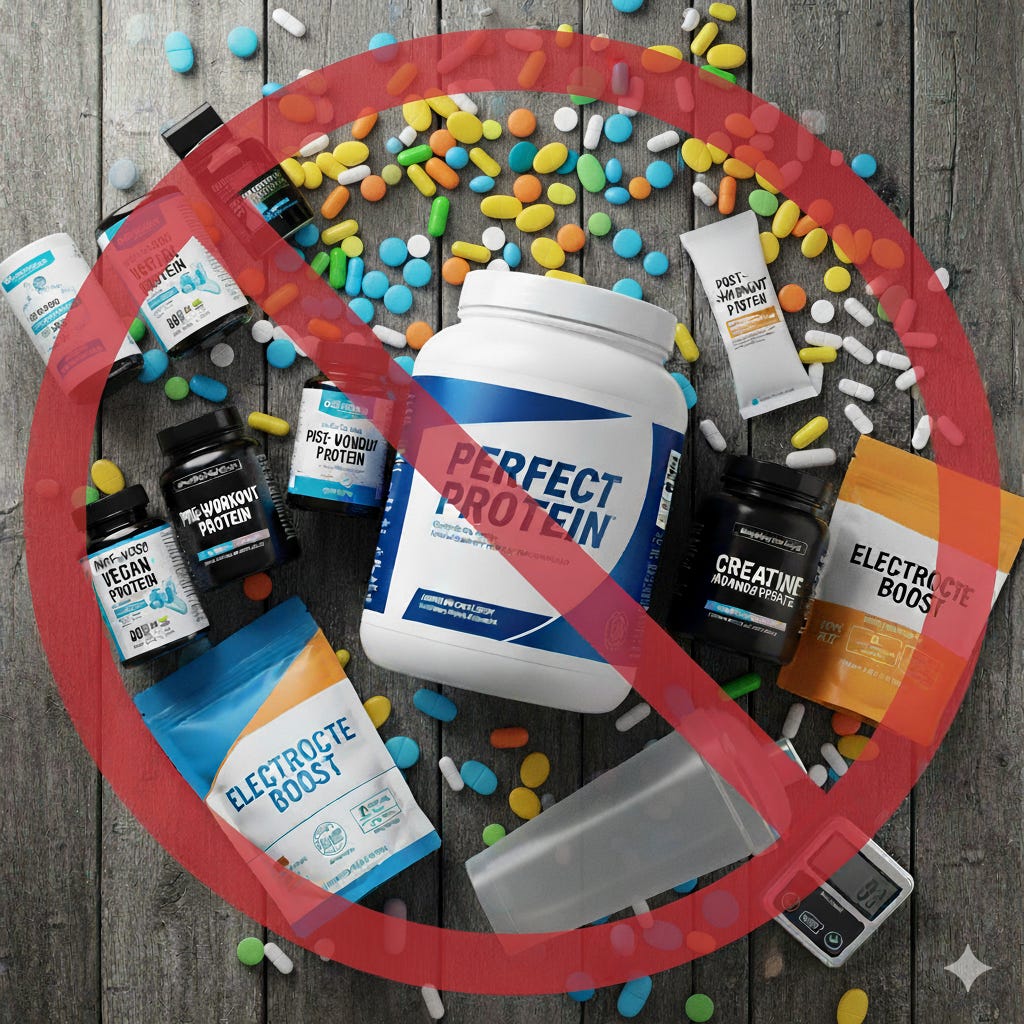Stop Buying Supplements: Why You’re Probably Wasting Your Money
Most of us, even highly active athletes, already get everything we need from food.
It’s a massive industry. Your social media feed is flooded with influencers suggesting that the latest stack of creatine, extra protein, and other supplements will skyrocket your performance.
I’m here to tell you that for most of us—even those in the top fitness bracket—this simply isn’t true. The scientific proof for many of these claims is weak or non-existent. I’ve been paying close attention to news from trusted sources, and the message is clear: Focus on food first.
Let’s dive into the two most hyped supplements and what you actually need to know.
Protein Powder: Overrated and Easily Replaced
Yes, I still enjoy a protein shake after my workout, but I seriously doubt it has a great effect anymore. I like the taste, so I’m working on my own recipe using natural ingredients—more on that in an upcoming post when I’ve perfected it!
Here’s the reality of protein intake:
Your Target: The standard recommended daily protein intake for active adults is around 1.5 grams per kilogram of body weight (some say up to 2 grams). For a person weighing 75 kg, that’s about 112 grams to 150 grams per day.
The Myth of Timing: Forget the high-stress idea that you have a “protein window” post-workout. Research shows that whether you eat protein pre-workout, during, or after doesn’t matter much. The key is to ensure you get a good dose of protein with every meal since your body cannot store it.
Real Food is King: If you aren’t a strict vegetarian, you are very likely already hitting your daily protein target. Most foods contain some protein, and it’s surprisingly easy to hit 1.5 g/kg with just a little attention.
Natural Sources are Better: Instead of reaching for an expensive powder, choose real, high-protein foods like curd cheese, lentils, peas, mozzarella, or goat cheese. These “real foods” also provide other critical nutrients that shakes lack, like fiber and essential vitamins.
The Bottom Line: You likely get enough protein. Adding a bit extra probably won’t hurt, but consider real ingredients before you waste money on the latest influencer-touted product.
Creatine: Limited Effect for Endurance Athletes
Creatine is constantly hyped to boost energy and build muscle. But what’s genuinely proven?
The Scientific Truth: The only currently agreed-upon and scientifically proven benefit is that creatine can help increase power and endurance during strength training. To see a benefit, you have to be doing intense, heavy strength work.
The Small Gain: Your body naturally produces creatine and fills up your muscle stores to about 60% to 80%. Supplements might get you to 100%, which is a 20% to 40% boost. That sounds good, but experts argue this gain only makes a measurable difference for those performing truly intensive training.
It Does Nothing for Endurance: For my endurance-focused activities—gravel biking and running—creatine has little to no effect. I took it for a while and saw exactly nothing. That’s why I stopped.
The Hidden Risk: Doses of 3 grams to 5 grams per day are considered safe. However, many people take way more (10 grams or 20 grams even), which can be dangerous and lead to stomach issues or unwanted water weight gain.
The Rebound Effect: If you take extra creatine, your body may reduce its own ability to create it. This is sad, though luckily this effect reverses after a few weeks once you stop supplementing. Proper sleep and a healthy diet are likely way more important than the 20% boost you might get from a supplement.
What I Actually Supplement (The No-Brainers)
There are a few things I do supplement because the science is clear and the need is universal:
Magnesium: Plays a crucial role in muscle contraction and nerve function. Great for active people.
Omega-3 Fatty Acids: Have strong anti-inflammatory properties, which significantly aids in daily recovery.
Vitamin D: A no-brainer if you live in a northern climate and don’t spend every winter day running around naked (not sure how much sauna counts here). It’s essential for bone health and the immune system.
A Note on Fueling
Finally, let’s talk electrolytes. I don’t rely on expensive electrolyte drinks for my endurance sessions. A simple fruit juice diluted 1:3 with water works perfectly to replenish sugars and some salts. Save your money.
So, before you drop a fortune on powders and pills, take a moment to look at your plate. You’re likely stronger and better-fueled than the supplement companies want you to believe.
What is the one natural food you rely on to fuel your workouts and recovery? Share in the comments!



